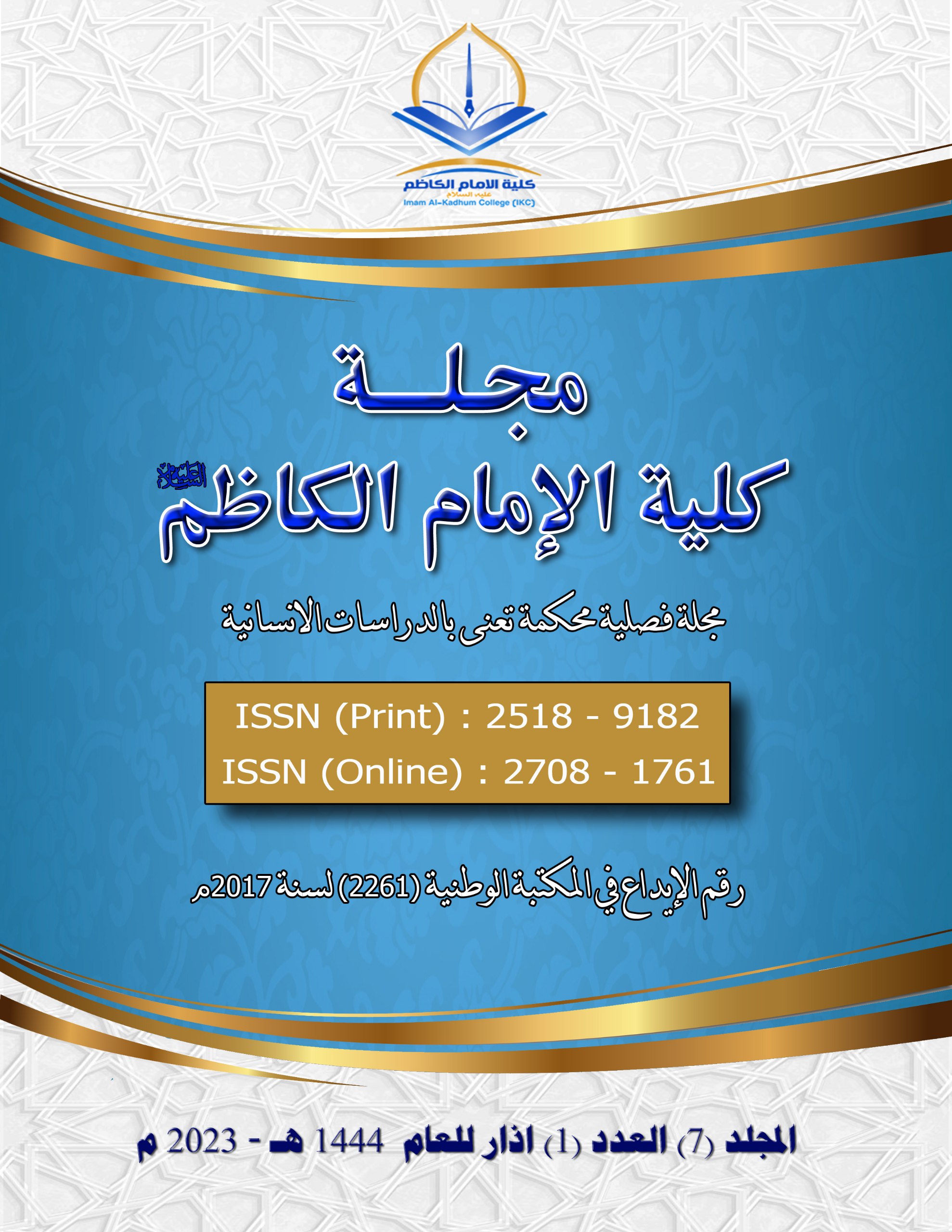محو الأمية الرقمية ودعمها الكترونيا وفقا لنظرية التقرير الذاتي لدى طلبة المرحلة الاعدادية
الكلمات المفتاحية:
محو الامية الرقمية ، نظرية التقرير الذاتي ، دعم التعلم الكترونياالملخص
المستخلص
هدف البحث الحالي التعرف على محو الامية الرقمية ودعمها الكترونيا وفقا لنظرية التقرير الذاتي لدى طلبة المرحلة الإعدادية، وقد تحدد مجتمع الدراسة الحالية بطلبة المدارس الاعدادية لمديرية تربية محافظة بغداد الرصافة الثالثة الدراسة الصباحية، وتألفت عينة البحث من (300) طالب وطالبة بواقع (148) ذكور و(152) اناث، تم اختيارهم بالطريقة الطبقية العشوائية المتناسبة من (6) مدارس ،وتحقيقاً لأهداف البحث الحالي قام الباحث بأعداد مقياس محو الامية الرقمية مكوناً من (57) فقرة موزعة على خمسة مجالات وفقا لنظرية التقرير الذاتي وذلك لعدم وجود مقياس لهذا المتغير، وقد توصل البحث الى النتائج الاتية:
- ان طلبة المرحلة الإعدادية لديهم محو الامية الرقمية ودعمها الكترونيا .
- يوجد فروق ذات دلالة إحصائية في محو الامية الرقمية وفقا لنظرية التقرير الذاتي لدى طلبة المرحلة الإعدادية وفقا لمتغيري الجنس لصالح الذكور والفرع الدراسي لصالح العلمي.
وفقا لهذه النتائج خرج الباحث بمجموعة من الاستنتاجات والتوصيات والمقترحات.
المراجع
- Bedenlier, S., Bond, M., Buntins, K., Zawacki-Richter, O., & Kerres, M. (2020). Facilitating student engagement through educational technology in higher education: A systematic review in the field of arts and humanities. Australasian Journal of Educational Technology, 36(4), 126–150.
- Bergdahl, N., Nouri, J., & Fors, U. (2020). Disengagement, engagement and digital skills in technology- enhanced learning. Education and Information Technologies, 25(2), 957–983.
- Blau, I., Shamir-Inbal, T., & Avdiel, O. (2020). How does the pedagogical design of a technology enhanced collaborative academic course promote digital literacies, self-regulation, and perceived learning of students? The Internet and Higher Education.
- Boumarafi, B. (2018): Attitude Of Algerian Students Towards The Digital Culture And Its Impact On The Technology Use Based On The Technology, Acceptance Model (Tam), Revue Des Sciences Humanins & Social, N.50, P.P.226-237
- Chiu, T. K. F. (2021). Digital support for student engagement in blended learning based on Self-determination Theory. Computers in Human Behavior.
- Chiu, T. K. F., & Lim, C. P. (2020). Strategic use of technology for inclusive education in Hong Kong: A content-level perspective. ECNU Review of Education, 3(4), 715–734.
- Du, K., Wang, Y., Ma, X., Luo, Z., Wang, L., & Shi, B. (2020). Achievement goals and creativity: The mediating role of creative self-efficacy. Educational Psychology, 40(10), 1249–1269.
- Eshet, Y. (2004). Digital literacy: A conceptual framework for survival skills in the digital era. Journal of Educational Multimedia and Hypermedia, 13(1), 93–106.
- Green, j. S (2009): Reviewing Approaches and Perspectives on “Digital Literacy”, Pedagogies: An International Journal, Volume 4, pp107-125
- Hague, C., & Payton, S. (2010). Digital literacy across the curriculum. Futurelab.
- Hsu, H. C. K., Wang, C. V., & Levesque-Bristol, C. (2019). Reexamining the impact of self-determination theory on learning outcomes in the online learning environment. Education and Information Technologies, 24(3), 2195–2174.
- Ismailov, M., & Ono, Y. (2021). Assignment design and its effects on Japanese college freshmen’s motivation in L2 emergency online courses: A qualitative study. The Asia-Pacific Education Researcher, 30(3), 263–278.
- Jacobs, G. E.& other (2014): Production and Consumption: A Closer Look at Adult Digital Literacy Acquisition, Journal of Adolescent & Adult Literacy, v57 n8, p624-627.
- Lietaert, S., Roorda, D., Laevers, F., Verschueren, K., & De Fraine, B. (2015). The gender gap in student engagement: The role of teachers’ autonomy support, structure, and involvement. The British Journal of Educational Psychology, 85(4), 498–518.
- Martin, A., & Grudziecki, J. (2006). DigEuLit: Concepts and tools for digital literacy development. Innovation in Teaching and Learning in Information and Computer Sciences, 5(4), 249–267.
- Ng, W. (2012). Can we teach digital natives digital literacy? Computers & Education, 59(3), 1065–1078.
- Pekrun, R., Lichtenfeld, S., Marsh, H. W., Murayama, K., & Goetz, T. (2017). Achievement emotions and academic performance: Longitudinal models of reciprocal effects. Child Development 88 (5), 1653–1670.
- Pendell, K. D., Withers, E., Castek, J., and Reder, S. (2013). Tutor-facilitated adult digital literacy learning: Insights from a case study. Internet Reference Services Quarterly, (18), 105-125.
- Porat, E., Blau, I., & Barak, A. (2018). Measuring digital literacies: Junior high-school students’ perceived competencies versus actual performance. Computers & Education, 126, 23–36.
- Prior, D. D., Mazanov, J., Meacheam, D., Heaslip, G., & Hanson, J. (2016). Attitude, digital literacy and self efficacy: Flow-on effects for online learning behavior. The Internet and Higher Education, 29, 91–97.
- Reeve, J. (2016). Autonomy-supportive teaching: What it is, how to do it. In J. C. K. Wang, W. C. Liu, & R. M. Ryan’s (Eds.), Building autonomous learners: Perspectives from research and practice using self-determination theory. (pp. 129–152). Springer.
- Riel, J. (2012). The Digitally Literate Citizen: How Digital Literacy Empowers Mass Participation in the United States. Unpublished Master Dissertation, Georgetown University, USA.
- Ryan, R. M., & Deci, E. L. (2020). Intrinsic and extrinsic motivation from a self-determination theory perspective: Definitions, theory, practices, and future directions. Contemporary Educational Psychology.
- Ryan, R. M., & Deci, E. L. (2020). Intrinsic and extrinsic motivation from a self-determination theory perspective: Definitions, theory, practices, and future directions. Contemporary Educational Psychology.
- Sierens, E., Vansteenkiste, M., Goossens, L., Soenens, B., & Dochy, F. (2009). The synergistic relationship of perceived autonomy support and structure in the prediction of self-regulated learning. The British Journal of Educational Psychology, 79 (Pt 1), 57–68.
- Skinner, E. A., Furrer, C. J., Marchand, G., & Kindermann, T. A. (2008). Engagement and disaffection in the classroom: Part of a larger motivational dynamic? Journal of Educational Psychology, 100 (4), 765–781.
- Xie, K., & Ke, F. (2011). The role of students’ motivation in peer-moderated asynchronous online discussions. British Journal of Educational Technology, 42(6), 916–930.
منشور
النسخ
- 2023-10-20 (2)
- 2023-10-20 (1)
إصدار
القسم
الرخصة
الحقوق الفكرية (c) 2023 Journal of Imam Al-Kadhum College

هذا العمل مرخص بموجب Creative Commons Attribution-NoDerivatives 4.0 International License.





